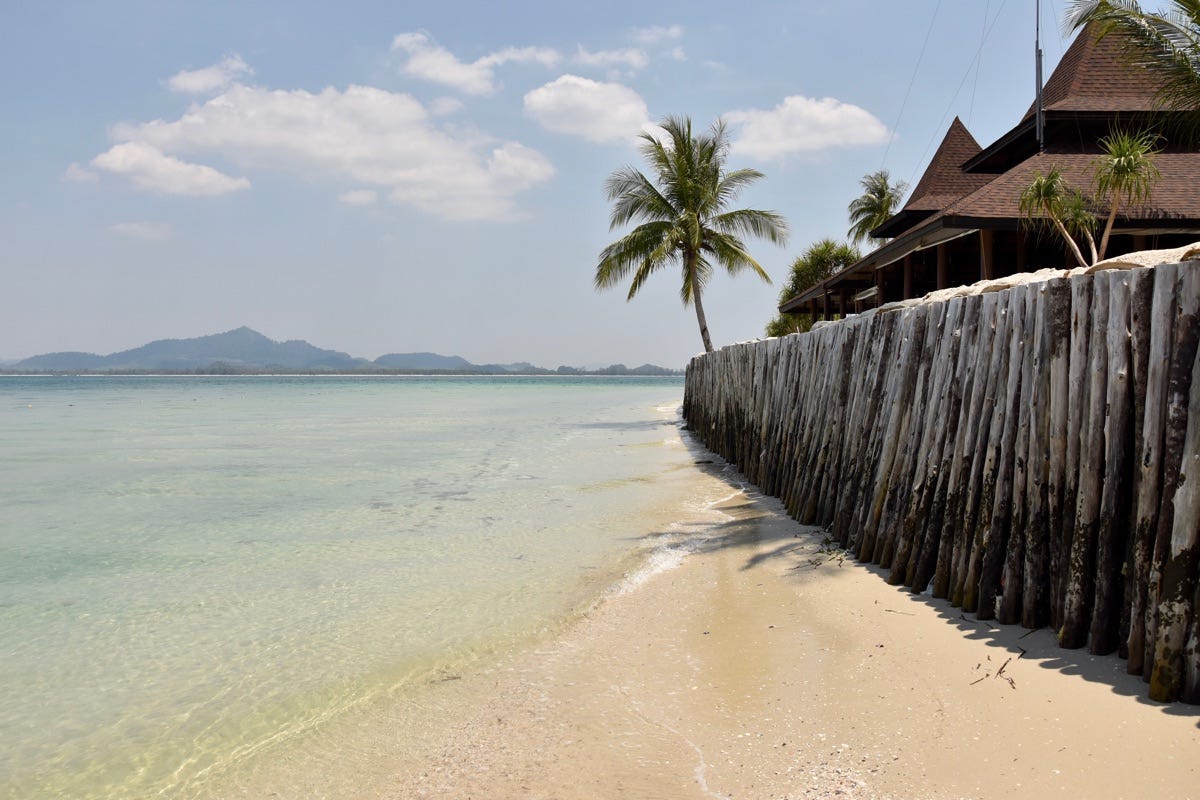Sorry for the delay in this, over the weekend I got savaged by some virus which kicked off with me temporarily going blind while riding my scooter with doggo on board. Please no jokes about that bringing me down to the riding standard of most tourists on a scooter in Bali. Thankfully traffic was light. Anyway, back on deck, though still shaking the last of this plague virus thing.
More than once over the last few episodes of this series, I’ve mentioned that as an absolute minimum, one should skip flying domestic. Today, I’m outlining my thinking on why I say this.
Writes Ryszard Kapuściński in Shah of Shahs:
“The Shah’s big money enabled him to breathe life into a new class, previously unknown to historians and sociologists: the petro-bourgeoisie. An unusual social phenomenon, the Petro-bourgeoisie produces nothing, and unbridled consumption makes up its whole occupation.”
I’ll get back to the above quote in a moment, first though I want to note, I’m a realist in saying flying is not going to go away. I’m not one who is going to argue that one should never fly. There are after all, many perfectly justifiable reasons for flying—both for work and play. I think flight shaming has a place, but the application of its concepts needs considerable fine-tuning.
Like the long distance steam cruiser and rail options it has surpassed, flying is the most time effective means to get from one side of the planet to the other. This convenience though, comes at a cost. There is no single personal mainstream activity that is more damaging to our planet than to get on an airplane. And yet, despite this, a minority of the Earth’s population does exactly this, day in day out.
How much to London? Photo: Stuart McDonald.
Intercontinental flights have long been a critical ingredient of long haul travel—it brings the entire globe within reach of a day spent in moderate discomfort. Few in the UK would holiday in Thailand if the only means of getting there was overland. Instead of weeks atop four wheels it’s a day atop four engines—I’ve written before on the “changing universe” appeal of flying—there is, in truth, nothing else like it.
If long haul travel is to remain a thing, long haul flights, likewise, will remain. To my mind, the question is what then? There are persuasive arguments for applying increasingly onerous surcharges on frequent fliers, while for others, a minority to be sure, offsets is seen as a reasonable approach. This though, is problematic.
To understand one of the reasons why, a brief look at the genesis of carbon counting is required. The concept was invented by the oil industry, well by an advertising company, Ogilvy & Mather, on behalf of an oil company, BP.
Excuse me while I am ill.
The campaign, launched in 2000, was a masterpiece of duplicity and misdirection. You don’t need to take my word for it being a masterpiece—it won an advertising award always a bad sign—and was described as:
“a landmark platform for a company trying to change the way the world uses, and thinks about, the fuels that are vital to human progress” [my emphasis].
The unstated message of the campaign was that addressing climate change was the responsibility of the world—not that of the company earning billions pumping oil out of the ground. To facilitate this “shared responsibility,” the carbon calculator was invented. This sexy little online tool would help each and every one of us total the impact of our personal existence, thus helping us to modify our behaviour to tackle climate change. In 2004, over a quarter of a million people used a carbon calculator—and not without reason—BP was spending north of US$100 million per year in part asking people “What on earth is a carbon footprint?” An odd question when you consider they invented it.
As soon as you start talking about carbon footprints though, you’re using language designed to mislead you, to shift blame and responsibility from the oil companies to you.
Ok, now that I’ve got that off my chest…
Travel with—not like—a local. Photo: Stuart McDonald.
In April 2022, Mongabay noted that aircraft generated some one billion tonnes of carbon. That might sound bad—it is—but the true picture is far worse—and complicated. This paper states that the complete “warming footprint” of aviation is considerably higher than the bare-bones carbon “score,” noting:
“Nevertheless, for all scenarios the warming footprint of aviation is at least twice as large as its carbon footprint in the coming decade, clearly highlighting that non-CO2 effects are non-negligible to assess the contribution of aviation to global warming.”
Please don’t get me started on why the emissions from military aircraft are exempt from all this, or that in 2021, gas flaring by the oil industry—a practice described by the World Bank as “totally unproductive”—alone generated 500 million tonnes of carbon. I digress.
As I wrote earlier in this series, getting down to the nuts and bolts of emissions is complicated. Even people who are far smarter than me (aka most of you), and who are not PR flacks for the oil or airline industries, cannot agree on exact counts. What sort of aircraft are you flying? How full is it? How old is it? How much cargo is it carrying? Which route is it flying? How long is the flight? How windy is it? What is the seating configuration? What class are you flying? All these questions (and many more) need to be answered to come up with accurate numbers.
Carbon-porn. Photo: Stuart McDonald.
These questions though, to a point, are a distraction. They’re a perverse take on the “unnecessary complexity breeds job security” maxim, clouding the air and making a clear answer difficult to determine. The answer however is exceedingly simple, and is as follows:
There is no single mode of public transportation that has a higher carbon footprint (bloody hell, here I am using BP language) than flying. If you want to minimise your footprint, any alternative mode of transport is preferable. Anything—well except for a cruise ship of course. Really—this is all there is to it.
If you are going to fly, then the above questions matter—you should fly on a new aircraft and in economy for example. With longer haul flights, I’ve read persuasive arguments that after a point, breaking the flight into two legs is preferable as at some stage you end up “burning fuel to carry it,” which makes sense to me.
An endangered species? Photo: David Luekens.
There are no shortage of pieces arguing that carbon offsets are a scam, or a form of greenwashing, but this is a bit of a baby meets bathwater thing. There are good projects, many of which are worth supporting even if you are not flying—you just need to put as much effort into selecting the right project as you do finding the cheapest (or most convenient or whatever) flight. The problem though, is unless the act of carbon offsetting is going to modify your behaviour, then you’re just affixing and ripping off the same bandaid over and over, while the oil companies are leaving the planet looking like a scene out of Bloodbath at the House of Death. Writes The New York Times:
“While individual activities do have environmental costs, and flying is one of the costliest, climate change is overwhelmingly driven by the actions of the fossil fuel industry. And the vast majority of carbon offsets are purchased by corporations, including fossil fuel companies themselves, on the premise that they can hit “net zero” emission targets without fundamentally changing how they operate.”
Behaviour modification—not only for the fossil fuel companies, but you and me too—is required, and with my above assumptions in mind, once you are in the region you should not fly regionally and you absolutely should not fly domestically. If you have just flown long haul, do not fly short haul. Here is why:
There is nowhere in Southeast Asia that can only be reached by aircraft. On some of the busiest air routes in the region, there are perfectly adequate ground transportation options—most often train or bus. Taking a short flight, on a per kilometre basis, is the worst polluting kind—on this the evidence is clear. If your itinerary doesn’t work without mid-trip flights, the problem is you and your itinerary. Fix that. If you’re recoiling at the suggestion of a 12-hour bus trip, then break it up—see more by seeing less.
Already grasping. Photo: David Luekens.
This ties in with what I was writing about slow travel, which in turn hooks in to sustainable tourism and responsible tourism—slow down and smell the coffee. Research has indicated there is one group of travellers who tend to fly less than other types of tourists—independent and budget travellers … dare I say … backpackers. Those who tend to fly more? The big-spenders—the very market tourism boards are gagging for more of.
Much has been written on how the climate change wrecking ball will smash island and coastal economies—archipelago nations like Indonesia and the Philippines will be particularly hard hit, but the damage is hardly limited to those nations. A study from 2018 looked at what could happen to Thailand’s beaches in the face of rising sea levels. They wrote:
“The results indicated that present beaches have rather small widths, and national beach loss rates in the future are projected to be more than 45.8% even for the lowest RCP2.6 scenario. The projected loss rate may reach a maximum of 71.8% where 23 beach zones will be completely lost.”
The report notes Thailand’s Andaman Sea coast as being particularly at risk, and while the study is looking at what changes would be manifested 80 years from now, these are gradual changes—even in half the time span—40 years from today, the damage would already be formidable. Would you still travel to the Andaman Coast if there were no longer any beaches? In writing about tourism, I’ve often trotted out the paving over paradise cliché, but perhaps submerging it is a more fitting term for this century. The irony of Thailand so emphatically chasing big spending tourists—the ones who will, through their flight practices, contribute more than any other to the country’s vanishing beaches, should not be lost on anyone.
Those who will bear the brunt of climate change are those least equipped to respond to it. There’s a whole range of reasons for this—inept and corrupt government being a standout, but tourism is far from blameless. The carbon deposited in our upper atmosphere thanks to discretionary flying, has, for decades been largely the doing of the West.
Responsibility should not be evenly shared. Photo: David Luekens.
Yes, in more recent decades flying in Asia (particularly China), Africa and South America has increased in popularity, but carbon emissions are a cumulative game. As was seen thanks to the pandemic-forced reduction in flying, when the planes stopped, there wasn’t a commensurate fall in carbon. The damage done since the 1950s is going to take generations to address, and yet those destined to wearing its worst excesses will be the populations who never had the privilege of being able to whine about Jack in 32C reclining before take-off.
This is what brings me to Kapuściński’s quote up top. He was writing of the Shah’s entourage of sycophants and hangers-on, parasites who enriched themselves as the general population suffered untold hardships. When you take a long bow to tourism, through the very act of its discretionary and flippant flying, is it really that different?
Reduce your flying today. Take fewer but longer trips. Do your research and offset what you do fly in a smart fashion. Do not fly domestic.
Let your travels make time and the planet will thank you for it.
Other episodes in the Rethinking Tourism series:
National Chocolate Milk Day (World Tourism Day)
Nice Tourism (Sustainable Tourism)
The Benevolent Lie (Responsible Tourism)
The Year Is 2006. The Town Is Luang Prabang (Pro-poor Tourism)
Zoom in to the Red Plastic Chairs (Slow Travel)
The Petro-bourgeoisie (Flying, carbon etcetera)
Reality Check (Tour companies)
Follow the Money (Money matters)
Foundations Matter (Community Based Tourism)
Couchfish is 100 per cent independent and reader-supported. If you’re not already a subscriber, and you’d like to show your support, become a paying subscriber today for just US$7 per month—you can find out more about Couchfish here—or simply share this story with a friend.
Don’t forget, you can find the free podcasts on Apple, Pocket Casts and Spotify as well as right here on Couchfish.


















Share this post